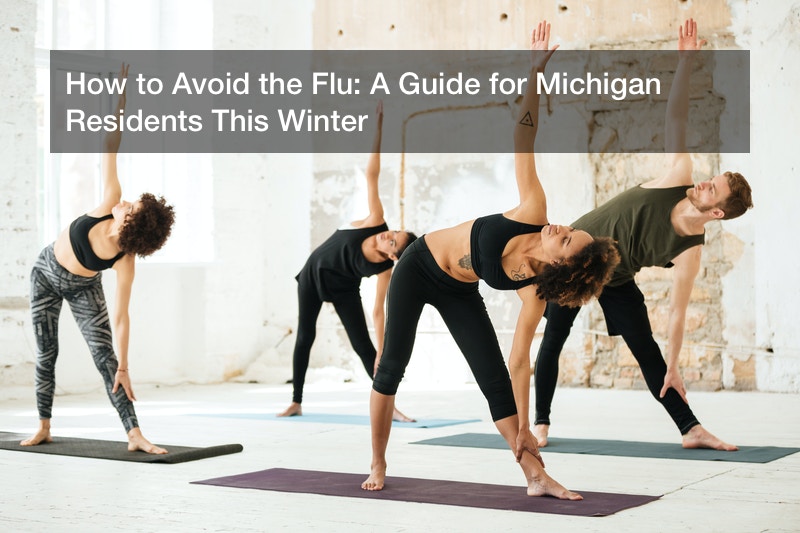

In this day and age, many of us don’t take the flu as seriously as we once did. Some people even treat the flu as something like a rite of passage, “saving money” by skipping over flu vaccines. Many of us don’t even focus on how to avoid the flu anymore, almost expecting that it will happen and assuming that we can ride it out. This is in part because, in the western world at least, the flu is no longer seen as a commonly deadly illness. If you’re lucky enough to live in a country with advanced medical care, chances are that you probably won’t die if you catch the flu. But that’s not a guarantee — in the United States, over 80,000 people died from the flu in the 2017-2018 flu season alone, according to the Center for Disease Control and Prevention. This is almost double the number of people estimated to have died in car accidents. Furthermore, the flu can manifest in several different ways. There is not just one type of flu. Some strains are more likely to manifest in congestion-related symptoms, causing coughing and sneezing. Other types cause symptoms related to the digestive tract, like vomiting and diarrhea. With that being said, a fever is common with most cases of the flu, and this is what can ultimately lead to more severe complications.
Certain people are more vulnerable to the flu than others. Those who have immune systems already compromised by other diseases — such as cancer — or health conditions are more likely to have issues with recovering from the flu. They’re more susceptible to fevers and have a hard time fighting off infections. This is especially true in colder climates, like those found in Michigan winters, which are already hard on compromised immune systems. For similar reasons, the very old and very young are also susceptible to the flu. Another problem that comes with these populations and dealing with the flu is the fact that they often cannot deal with the types of treatments necessary to fight off the flu. For that matter, there are practical concerns that come with dealing with the flu; a lot of people don’t have the most useful health insurance policies and may end up spending a lot of money on emergency care. The fact is that you should concentrate less on dealing with the flu once you catch it, and more on how to avoid the flu in the first place. With that being said, let’s look into how to avoid the flu, moving beyond the obvious.
1. Get A Flu Vaccine

Yes, we do have to deal with the obvious first! The fact is that flu vaccines are not only safe but by and large effective. You may at first balk at the out of pocket expenses associated with these vaccines, as well as the general hassle of making a doctor’s appointment to get them. However, you don’t have to go to your doctor’s office to get a flu vaccine — and there are options available, even if you don’t have health insurance Many urgent care clinics offer a variety of different vaccines, sometimes for less than what you would pay at your doctor’s office. You’ll also find that a variety of different pharmacies and even big box grocery stores offer affordable flu vaccines. Depending on your income level and demographic, some affordable care clinics even offer free flu vaccines from time to time. It’s really a matter of looking out for these types of special events. With that being said, flu vaccines are not options for everyone. They can occasionally cause some degree of fever for a short period of time following the initial vaccination, which makes them less than ideal for some people with compromised immune systems, for the same reason that the flu, in general, must be avoided. Furthermore, sometimes the flu vaccine is ineffective against certain strains of the flu. At times, you may simply be vaccinated too late to truly avoid the flu. Nonetheless, if the flu vaccine is an option for you in terms of your health, you should get it every year.
2. Boost Your Diet
If you’re looking into how to avoid the flu in addition to the flu vaccine, you’ll probably guess that your personal wellness factors greatly into the issue. If you aren’t as healthy as you can be, you’ll be more likely to catch the flu. It’s really about strengthening yourself, and you can do this in part by boosting your diet with flu-fighting foods. You’ll especially want to focus on this during the winter when a lot of us naturally become winter due to the harsh weather conditions. Certainly, try to take regular multivitamins — which you can pick up by visiting your local health food store. But you should also change your regular diet if you’re really focusing on how to avoid the flu. For one thing, you should incorporate more probiotics into your meals. This can be done by eating Greek yogurt. This will help balance your gut bacteria, which in turn aids in fighting off infections. Additionally, you can eat foods like sauerkraut for a similar effect — though a lot of people understandably find Greek yogurt more palatable. Try drinking green tea as well; green tea has high levels of polyphenols and catechins, which bolster the immune system and will make it easier for you to avoid infections. Of course, you can add in supplements like whey protein powder to make yourself stronger and healthier… But if you’d rather just build up the nutrients and vitamins you need through your regular foods, build up your citrus consumption for vitamin C, intake vitamin D — which many of us are deficient in — by trying sardines, and build your zinc levels through beef consumption. If you really want to focus on how to avoid the flu, you should make it a part of your winter lifestyle. Theoretically, the flu can attack all year round, and it’s always a good idea to be as healthy as possible. Think of this as building good habits!
3. Practice Clean Habits

Of course, nobody really looks at themselves as dirty or unsanitary. But once you research how to avoid the flu properly, you may realize that you’ve been falling back on a lot of unsanitary habits. Sometimes as simple as touching your face overmuch could make it easier for you to catch the flu. You may also discover that you’re not disinfecting yourself properly. Try carrying a pack of disinfectant wipes with you during flu season, and wipe down surfaces like grocery store carts and doorknobs before you touch them. Furthermore, use hand sanitizer in general on a regular basis. This may dry out your skin, especially during the winter — so back it up with moisturizing lotion. Wash your hands, and regularly clean and disinfectant your kitchens and bathrooms, especially after having guests to visit. Remember that you’re not just doing this for you. If you work with kids at a daycare or older people at a nursing home, you’ll be looking after other people who have more to risk by catching the flu than you do. Concentrating on how to avoid the flu is about public health safety, as well as your own. But on the other hand — what happens if you need to care for someone who already caught the flu themselves?
4. Protect Yourself Against The Sick
When researching how to avoid the flu, you’ll probably notice that avoiding the sick is one of the best ways to avoid catching the virus in general. You should stand at least three feet away from people who are sneezing, for example; and if you can avoid going to places where sick people often are, like the emergency room, you should do so. However, if one of your loved ones catches the flu, it’s likely that they won’t be able to care for themselves entirely on their own. Nor can you just leave them to their own devices and stay somewhere else! You can be a good caretaker to someone who caught the flu and avoid it yourself. Again, having a flu shot certainly minimizes your own risk of catching the flu in the first place. But if you failed to do so in time, or are simply dealing with a strain that your vaccine doesn’t protect against, you should simply be careful. Employ frequent handwashing when caring for the sick; but alongside that practice, you should wear surgical gloves. Toss them in the trash after using them — perhaps in the same garbage can that things like tissues should be thrown away within. Use the gloves not only when caring for the sick in general, but when disposing of these types of used products. You can never be too careful; and on that note, you may want to wear a surgical mask as well. If you sleep in the same bed with someone who has caught the virus, have them sleep on their own side of the bed when sick, and ensure that they use a pillow that is specifically theirs. If you can, you may even want to sleep in a different bed or the couch during this time. Avoid being in the same spot as them for about 24 hours after they’ve shown symptoms, and then strip and wash all of their linens. You should also store your toothbrush in a place where it’s out of sight, and therefore cannot be breathed upon by a sick person.
5. Get Your Rest

It’s easy to stress about the flu, especially if you’re working with sick people. However, if you spend too much time thinking about how to avoid the flu — and how likely it may or may not be that you’ll catch it anyway — you may fall into the trap of stressing out too much. That stress will cause you to be weaker. Furthermore, it may prevent you from getting the sleep that you need. If you really want to prioritize how to avoid the flu, you should get as much sleep as possible. Don’t strain yourself during the flu season, however difficult it may be to relax. The more rest you get, the stronger you’ll be. The fact is that the essence of how to avoid the flu is making your body strong enough to fight off the virus before it takes hold. It can’t do that if you don’t get your rest.
Chances are that you’ll have the flu at some point in your life, or have already had it — but once is definitely enough, don’t you think? If you focus on how to avoid the flu, rather than fixing the issue once it’s already happened, you won’t have to deal with the discomfort and stress of the illness. Furthermore, you’ll be able to avoid the lost work or school days often come with the flu. Your life will be a lot easier if you strengthen yourself against the virus. Get your rest, eat healthy, flu-fighting foods, protect yourself against the illness, and practice good habits. But to start with, don’t forget to get your vaccine! That way, you’ll be much less likely to deal with the sickness in the first place, and can focus on having a healthy and happy winter.


